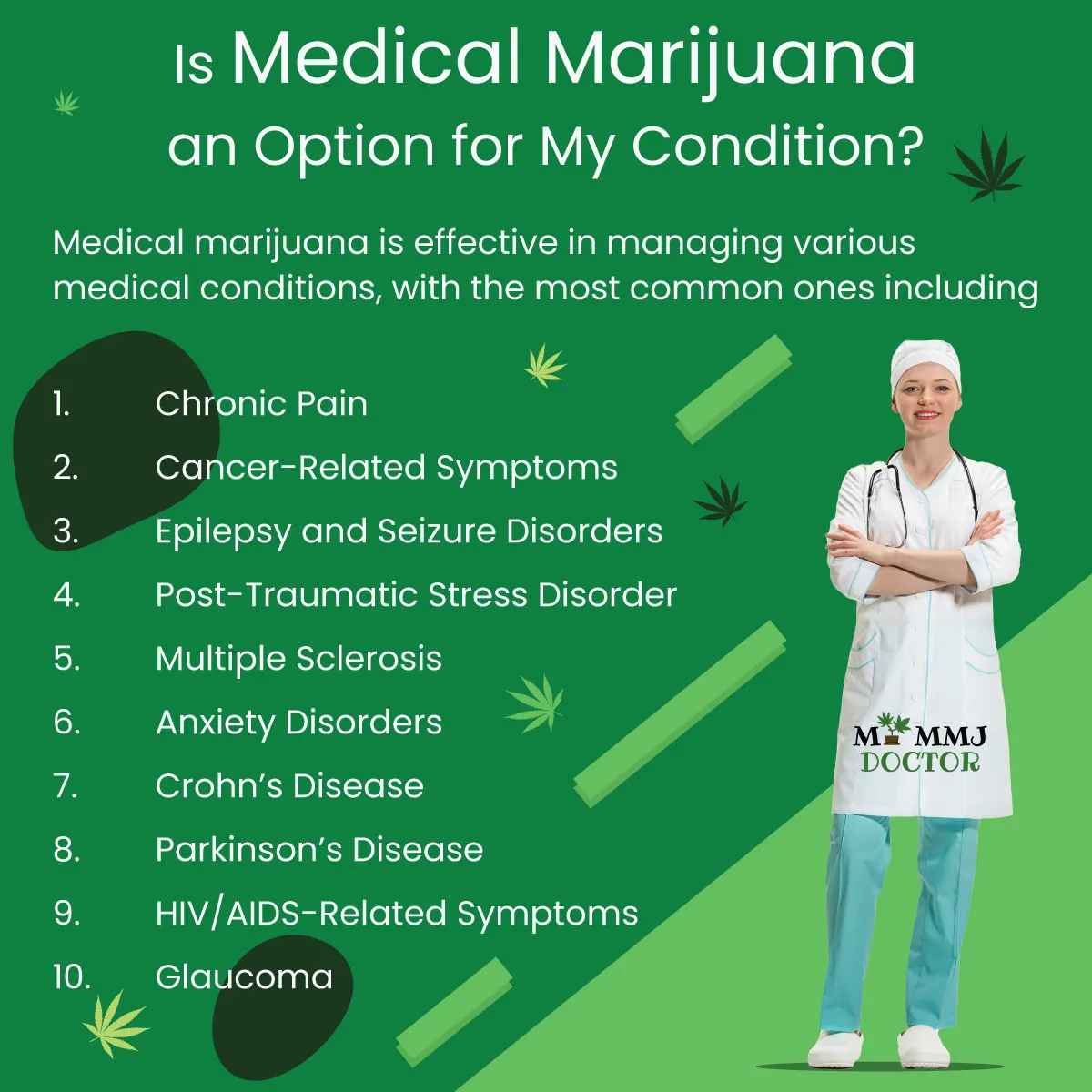What are the Essential Questions to Ask Your Medical Marijuana Doctor?

As stigma fades, millions of people across the U.S. are turning to medical marijuana and benefiting from its therapeutic effects.
Still, if you’re considering medical marijuana, you might have questions. Is it the right choice for you? Before beginning an in-person consultation or seeking advice from a trusted medical marijuana consultation site or online platform, what should you consider?
Talking to a medical marijuana doctor can clear up your doubts and give you the guidance you need. And to get the most out of your visit, it helps to ask the right questions.
Not sure where to begin? Keep reading—we’ve got you covered.
13 Essential Questions to Ask Your Medical Marijuana Doctor
1. Should I Consider Medical Marijuana?
This is a great opening question because it sets a collaborative tone with your doctor. Instead of coming in with demands, you’re showing that you value their professional opinion. Doctors are medical experts and might suggest options or approaches you haven’t considered.
Additionally, this question helps you understand your doctor’s stance on how medical marijuana works and everything about it. Some doctors may be open to exploring it, while others might be more conservative. If they are dismissive or overly eager to prescribe without a proper discussion, it could be a sign that they may not prioritize your overall well-being.
It’s also important to keep in mind that you need to have a qualifying condition, as determined by your state’s regulations, to qualify for medical marijuana. Each state has a list of conditions that qualify for medical marijuana use, and your doctor can help determine whether your condition fits these criteria.

2. Can Medical Marijuana Help My Condition?
This question allows you to discuss the potential benefits and limitations of marijuana for managing your symptoms. This leads to further questions including:-
- Is Medical Marijuana Effective for Managing Chronic Pain?
Chronic pain is one of the most common reasons patients turn to medical marijuana. Ask your doctor if it suits your condition and how it compares to other treatments. Understanding its effectiveness can help you weigh the pros and cons of including it in your care plan. - Can It Alleviate Anxiety or Depression?
If you’re struggling with mental health issues like depression or anxiety, ask your doctor if medical marijuana can provide relief. It’s important to discuss potential risks, as certain strains or dosages might worsen symptoms in some individuals. - Does It Improve Sleep Quality?
Sleep disturbances can significantly impact overall well-being. Discuss whether medical marijuana can help with insomnia or other sleep disorders, and inquire about the best strains or dosages for promoting restful sleep. - Does It Provide Benefits for Neurodegenerative Diseases Such as Parkinson’s or Alzheimer’s Disease?
Medical marijuana is being studied for its potential to alleviate symptoms associated with neurodegenerative diseases. If this applies to you or a loved one, ask your doctor about its role in managing symptoms like tremors, stiffness, or memory decline.
3. Which Medical Marijuana Product Is Best for Me?
Medical marijuana comes in many forms, such as edibles, tinctures, vaporizers, or capsules. Strains also vary, with Indica known for relaxation, Sativa for energy, and hybrids offering a mix. Products can also have different CBD and THC levels, affecting their impact.
Ask your doctor to recommend a product that aligns with your health goals, lifestyle, and comfort level. For example, they might suggest a high-CBD tincture for pain relief without the high or a low-dose edible if you’re new to marijuana. Their advice can help you make a choice that’s both effective and manageable.
4. What Are the Side Effects and Risks?
Discussing side effects with your doctor will help you understand what to expect and how to manage them. For example, a high-THC product might impair focus or cause anxiety, while a balanced CBD-THC product could provide relief with fewer drawbacks. Understanding these risks will ensure that you are fully prepared.

5. Will Marijuana Interact With My Other Medications?
Your doctor should review your medical history and any medications or supplements you’re taking. Marijuana can interact with certain drugs, potentially increasing or reducing their effectiveness. Even common substances, like caffeine, can interact with medications, so it’s worth exploring any potential risks.
If you’re thinking of replacing a current medication with marijuana, discuss this thoroughly with your doctor. Abruptly stopping a medication without guidance can lead to complications, and they can help you transition safely if it’s the right choice.
6. Will Marijuana Affect My Daily Routine?
It’s important to know how medical marijuana might impact your ability to carry out everyday activities. THC, the psychoactive component in marijuana, can cause drowsiness, impair motor skills, and affect decision-making. This can be especially important when driving, working, or caring for others.
If you want the benefits of marijuana without the high, ask your doctor about products that are low in THC or high in CBD. Knowing how each product might affect you ensures that you can balance treatment with your responsibilities.
7. What Are the Legal Rules for Using Medical Marijuana?
Medical marijuana laws can vary by region, covering aspects like possession limits, where you can use it, and whether you can grow your plants. While your doctor isn’t a legal expert, they should be familiar with basic regulations and can guide you accordingly.
It’s also wise to do your research to stay informed. Understanding the legal framework can help you avoid unintentional violations, such as carrying marijuana in restricted areas or using it in public spaces.
8. How Do I Know the Right Dosage for Me?
Determining the correct dosage of medical marijuana can be challenging because it varies based on factors like your medical condition, body chemistry, and the type of product you use. Ask your doctor:
- What’s the starting dosage?
Many physicians recommend starting with a low dose and gradually increasing it to find your optimal level. - Should I microdose?
Some patients benefit from small, frequent doses instead of a single large dose. - How does the method of consumption affect dosage?
Smoking, vaping, edibles, and tinctures have different absorption rates and effects, so the ideal dosage depends on the method you choose.

9. Can It Affect My Mental Clarity or Memory?
One common concern about medical marijuana is its potential impact on cognitive functions like mental clarity and memory. Ask your doctor:
- What are the short-term effects on focus and memory?
Some strains or dosages may cause temporary changes in concentration or memory. - Are there long-term risks?
Prolonged use might affect memory for some individuals, depending on their age, dosage, and frequency of use. - How can I minimize cognitive side effects?
Your doctor can guide you on choosing strains or products that have minimal psychoactive effects while still providing relief for your condition
10. Will I Feel “High” if I Use It?
A common concern for patients new to medical marijuana is whether it will cause psychoactive effects. Ask your doctor:
- What products minimize the “high”?
Medical marijuana products high in CBD and low in THC are less likely to cause psychoactive effects. - Does the method of consumption matter?
Edibles, tinctures, and topicals can have different effects compared to smoking or vaping. - How can I control these effects?
Starting with a low dose and gradually adjusting can help you avoid feeling overly sedated or euphoric.
11. What Are the Possession Limits in My State?
Medical marijuana possession limits vary widely across the United States and depend on the state you reside in. These limits ensure patients can access the medication they need while preventing misuse. Here’s a closer look at possession limits that you should know for various states:
- Arizona
Patients can possess up to 2.5 ounces of usable marijuana every two weeks. This applies to flowers, edibles, tinctures, and other forms of medical marijuana. - Missouri
Patients are allowed to possess and purchase up to 6 ounces every 30 days. The state must approve any exceptions. - California
Medical marijuana patients can possess up to 8 ounces of dried flower and cultivate up to six mature or 12 immature plants. However, local jurisdictions may impose stricter limits. - Illinois
Patients can possess up to 2.5 ounces of usable cannabis within 14 days. This limit can be waived if a physician provides a written explanation of medical necessity. - Pennsylvania
Patients can possess a 90-day supply of medical marijuana products, including flowers, oils, and edibles. The specific amount is determined by the physician’s certification. - Michigan
Adults may possess up to 2.5 ounces of marijuana, including up to 15 grams of marijuana concentrate. - Colorado
Patients can possess up to 2 ounces of usable marijuana and grow up to six plants, with no more than three in the flowering stage. - Georgia
Patients are limited to 20 fluid ounces of low-THC cannabis oil. Flowers, edibles, and other forms are prohibited under current laws. - Minnesota
Patients can purchase up to 30 days’ worth of medical cannabis, which includes both flower and non-smokable products. The amount is determined by dispensaries based on the doctor’s recommendation.
12. What Do I Need to Do to Get Marijuana Legally?
Asking about how to get marijuana legally is a crucial step when consulting a medical marijuana doctor because they are the most reliable source for understanding the specific requirements in your state. Here’s why it’s important:
- State Laws Vary: Medical marijuana laws differ from state to state, including qualifying conditions, possession limits, and where you can legally purchase cannabis. A medical marijuana doctor can provide state-specific guidance tailored to your needs.
- MMJ Card Requirements: To legally access medical marijuana, most states require a valid Medical Marijuana Card (MMJ Card). Your doctor can explain the process, help determine if you qualify, and assist in certifying your eligibility.
- Understanding Expiry Dates: MMJ cards have expiration dates that vary by state. Your doctor can inform you of the renewal process, ensuring you maintain legal access to cannabis without interruptions.
- Personalized Advice: A medical marijuana doctor can address your specific health concerns, recommend the right cannabis products, and advise on dosage, which is crucial for safe and effective use.
13. How can I get my own MMJ card?
Obtaining a Medical Marijuana Card (MMJ Card) varies from state to state. Your doctor will guide you through the steps required, ensuring you meet all the legal requirements.
- State Registration Guidance: After receiving a doctor’s recommendation, most states require you to register with their medical marijuana program. Your doctor can help you understand this process, including submitting the necessary documents and fees.
- Online and Offline Options:
- Offline: You can visit a clinic for an in-person evaluation by a certified doctor. Once they recommend, you’ll register with the state to receive your MMJ card.
- Online: You can complete your evaluation online with virtual services like My MMJ Doctor. You’ll receive your doctor’s recommendation digitally and can register with the state without visiting a clinic.
- Offline: You can visit a clinic for an in-person evaluation by a certified doctor. Once they recommend, you’ll register with the state to receive your MMJ card.
Take Away
A medical marijuana doctor is there to guide you, ensuring that this treatment aligns with your health goals and legal requirements. So, don’t hesitate to start the conversation—you’re taking an important step toward better managing your health and well-being.
Related Articles
How to Get a Medical Marijuana Card in Maryland?
How Can You Obtain Your Medical Marijuana Card in Maryland in 2025?Are you a Maryland resident seeking a way to manage your symptoms naturally? You came to the right place. Maryland has a medical marijuana program that allows eligible...
Benefits You Are Missing Without a Michigan MMJ Card
Top Benefits of a Michigan Medical Marijuana CardIf you live in Michigan and already use cannabis, you likely know it’s easy to access. However, many people don’t realize that having a Michigan medical marijuana (MMJ) card offers additional...
What are the Michigan Medical Marijuana Laws?
What are the Michigan Medical Marijuana Laws?Medical marijuana has been legal in Michigan since 2008, helping thousands of residents manage chronic pain, anxiety, cancer symptoms, and more. But knowing what’s allowed - and what’s not - can...






0 Comments